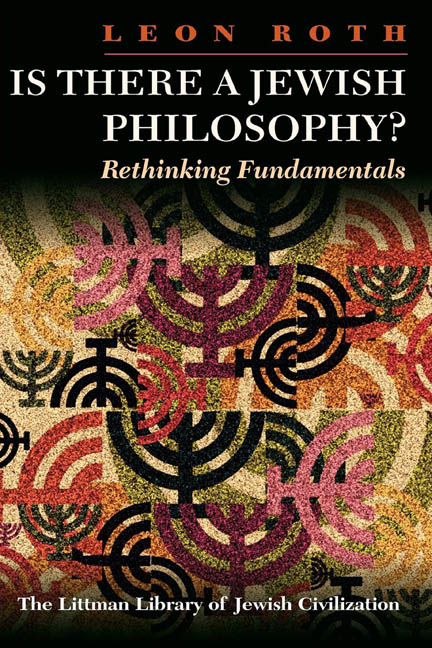Book contents
- Frontmatter
- Dedication
- Contents
- Publisher's Note
- Foreword
- Note
- Is there a Jewish Philosophy?
- Imitatio Dei and the Idea of Holiness
- Jewish Thought as a Factor in Civilization
- The Significance of Biblical Prophecy for Our Time
- Some Reflections on the Interpretation of Scripture
- Baruch Spinoza: His Religious Importance for the Jew of Today
- Judaism: The Elements
- Authority, Religion, and Law
- Moralization and Demoralization in Jewish Ethics
- Mysticism, Thick and Thin
- Back To, Forward From, Ahad Ha'am?
- Maimonides
- Bibliography of the Writings of Leon Roth
- Index
Maimonides
- Frontmatter
- Dedication
- Contents
- Publisher's Note
- Foreword
- Note
- Is there a Jewish Philosophy?
- Imitatio Dei and the Idea of Holiness
- Jewish Thought as a Factor in Civilization
- The Significance of Biblical Prophecy for Our Time
- Some Reflections on the Interpretation of Scripture
- Baruch Spinoza: His Religious Importance for the Jew of Today
- Judaism: The Elements
- Authority, Religion, and Law
- Moralization and Demoralization in Jewish Ethics
- Mysticism, Thick and Thin
- Back To, Forward From, Ahad Ha'am?
- Maimonides
- Bibliography of the Writings of Leon Roth
- Index
Summary
Life and Writings
MAIMONIDES ('SON OF MA1MON’), MOSES; known by the scholastics as Rabbi Moyses or Moyses Judaeus or Moyses Aegyptius, in Hebrew literature as Rambam, also Maimuni. Born Cordova, south (Arabic) Spain, II38. Left Cordova as a boy of 13 with his family after the seizure of the country by the religiously intolerant Almohades, and after long wanderings finally settled in Egypt where his father, Maimon, died. When his brother David, a pearl merchant and main support of the family, was drowned at sea, he turned to the profession of medicine, becoming in II70 physician to the viceroy of Egypt. Died 1204.
His works, all composed under the stress of travel or business, included commentaries on some tractates of the Talmud; a complete Commentary (finished c.II68), still widely used, on the early (second- and third-century) rabbinic code, the Mishnah; an original Code of his own, the Mishneh torah (Repetition of the Law), completed C.II78, preceded by a Book of Precepts in which the attempt is made to systematize the approach to the content of Judaism as a religious and moral discipline expressed in the commandments of the Pentateuch; some short medical treatises (e.g. on asthma and diet); some polemical writing (e.g. against Galen's view on teleology and against the prevailing blind belief in astrology); and many 'encyclical’ letters to Jewish communities, far and near, on points of law and on public issues of importance. These were his basic preoccupations and interests, and his philosophy was only incidental. The only technically philosophical work is his first, the very slight Logical Terminology, a brief account of the elements of Aristotelian logic which concludes with a summary conspectus of the main divisions of the Aristotelian system as a whole. The Guide for the Perplexed (completed II901), which was originally undertaken to help a favourite pupil whose studies had brought him into collision with religion and which was afterwards expanded to include 'others like him, however few they may be', is not a set philosophical treatise but, professedly, an unsystematic essay on some problems of philosophical theology.
Philosophical Character of all his Writings
Although Maimonides is thus not purely a philosopher, all his work is of a philosophical character in that it harks back to first principles.
- Type
- Chapter
- Information
- Is There a Jewish Philosophy?Rethinking Fundamentals, pp. 169 - 179Publisher: Liverpool University PressPrint publication year: 1999

